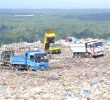DAVAO CITY,Philippines – Environment groups are convincing the City Government of Davao to reconsider its P2.5 billion waste-to-energy (WTE) facility as they recommend cost-efficient ways to reduce waste disposal in the city.
EcoWaste Coalition and Interfacing Development Interventions for Sustainability (IDIS) said on a press conference Monday that they are lobbying with the city council to reconsider the negative effect of waste incineration that the WTE project brings.
EcoWaste national coordinator Aileen Lucero said the city’s waste collection per day of 600 tons will not meet the daily target of 800 tons of waste required to run a WTE project every day. The effect of this is the city will only end up paying a project under contract without utilizing it.
Lucero also noted that the city’s solid waste collection are more on organic components comprising 50% biodegradable materials, including 29% residuals and 19% recyclables, which are not appropriate for WTE.
“Most of these wastes are biodegradable materials. Instead of being beneficial, the project will only force the city government to take garbage from adjacent areas just to keep up with the operation,” Lucero said.
Instead of waste incineration, both the EcoWaste Coalition and IDIS see the need of banning of single-use plastic as the major solution in curbing down daily waste consumption.
IDIS noted that single-use plastic such as bottles, cutlery, sachets, stirrers, straws, and the ubiquitous plastic bags and polystyrene containers or Styrofoam become the major cause of pollution to the natural environment, including the world’s ocean.
“Banning single-use plastics will have a huge impact on Davao City’s daily waste generation. This will translate to less plastic being produced, consumed and disposed of, less plastic being dumped or burned, less plastic leaking to the Davao Gulf and into the Pacific Ocean,” IDIS Executive Director Chinkee Golle said.
“Aside from the benefits of cutting plastic pollution, banning the single use plastics will also help in re-shaping people’s behavior with increased awareness on the need to cut down on plastic use and the overall disposable culture,” Golle added.
IDIS is now in talks with the City Council’s Committee on Environment to push for the passage of the local ordinance this year.
The City Environment and Natural Resources Office (CENRO) reported a 2.2% increase in waste collection last year 2018 from the 990,703 tons their personnel has collected in 2017.
Cenro reported that residential wastes comprised the bulk of all solid waste with 80.10%. Most of these wastes are kitchen scraps, yard waste, paper and card boards, glass bottles, etc.
Wastes from commercial sources such as food establishments, general stores, public markets and recreational centers and parks make up 12.8%. The industrial wastes from industries, farms and service centers add up to 3.2%. Hospital wastes contributed 1.70% while those belonging to others, specifically Institutions like government offices and academic institutions produce 1.60% wastes and slaughterhouses; dressing plants yield 0.60% of the total waste.
Cenro noted that recycling and waste segregation remains to be a challenge despite campaigns and even with the existence of the Ecological Solid Wastes Management Ordinance of 2009.(davaotoday.com)










